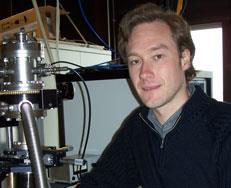John investigates the chemistry and physics of the regions of space between the stars
What is a postdoctoral research associate?

A postdoctoral position is one that normally follows on from a PhD (a post-graduate degree). Being a research associate means that the work revolves around research in a laboratory and you are part of a research group managed by a professor or doctor.
What do you do in your job?
I work within a research group in the physics institute at Münster University where I coordinate the astrochemistry related research activities. This research is directed to investigating the chemistry and physics of the regions of space between the stars, known as interstellar medium. To do this I use a range of experimental techniques including laser and light-based approaches which help us understand the conditions in the interstellar medium. Using the results that we obtain I write articles and prepare materials and talks for presenting at scientific conferences, where researchers meet to share their work and get new ideas. All university research is reliant on funding so I spend some of my time writing new research project proposals to gain funding for future projects. I also have teaching responsibilities, specifically in the undergraduate laboratory where I run practical exercises for undergraduate students at Münster University.
What do you enjoy most about your job?
There is a lot of flexibility in my working environment and I am generally free to take the research project where I wish. There is great satisfaction in developing an understanding of some of the fundamental chemical processes taking place in the universe, as well as in guiding junior researchers through their research projects.
What attracted you to becoming a postdoctoral research associate?
I have always been interested in the more quantitative aspects of physical chemistry, ever since I did my A-levels at school, and continuing on from a PhD towards postdoctoral research was an opportunity to not only use what I had learnt but take it further. The group I am now in enables me to combine the knowledge and experience I have in astrochemistry with the universities specialty in laser techniques used for analysis.
How did you get into your job?
I took A-levels in chemistry, physics and mathematics and having enjoyed aspects of both physics and chemistry decided to go on to study chemistry and molecular physics at the University of Nottingham where I gained an undergraduate MSc qualification. During my final year I had the opportunity of doing a research project which was conducted in the astrophysics laboratory. After my degree, and because I had enjoyed my research project, I embarked on a PhD on astrochemistry within the same research group. Following this I moved to Aarhus University in Denmark to continue working in science research. During this time I was also employed as an experienced researcher at the European Training Network “Laboratory Astrophysical Surface Science in Europe” who work to bring together the 13 leading research groups within astronomical research.
What are the opportunities for career progression?
Progressing along the academic career path is not easy and ultimately depends on obtaining funding, as well as demonstrating your ability to build and run an independent research group. Following on from the research associate position you would strive to continue to work up the ladder towards becoming a senior research fellow and managing your own research laboratory before becoming a professor, but that is a long path and would take you through your career.
What advice would you give for people wishing to enter your career area?
You have to be certain that you really are interested in the field of your research project. You should discuss possible research groups with your PhD supervisor and contact and visit those with whom you might consider working. Postdoctoral positions are often not advertised, and some groups might want you to apply for what is called a fellowship, where you have to find your own funding or support your position. You should, therefore, be looking for possible groups well before you are due to complete your PhD and you should also be clear what you want to gain from a position e.g. how will you time spend in a particular group enhance your personal and professional skills.
First published 2015













